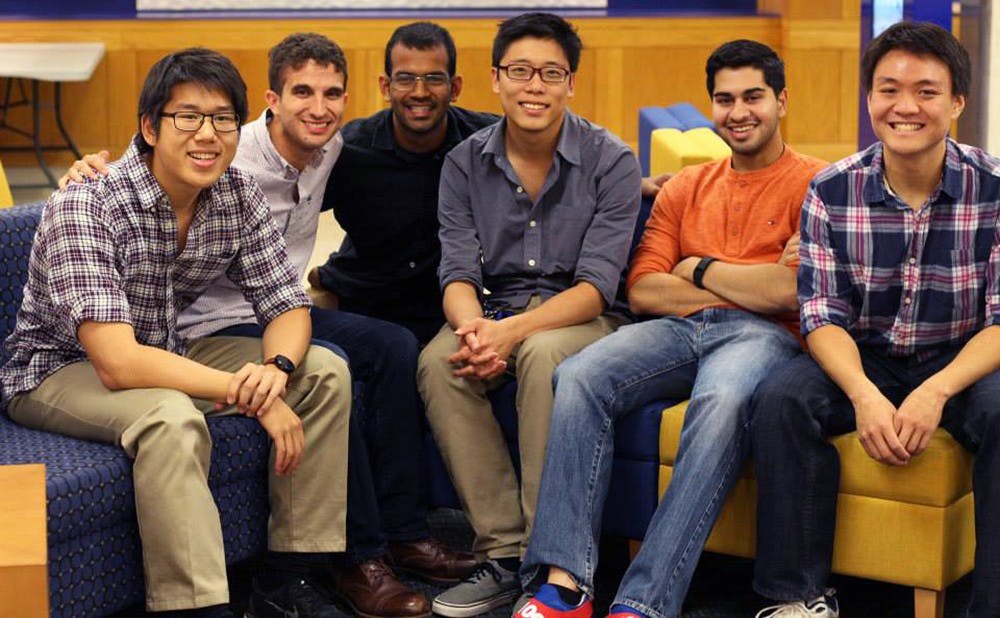Although farming begins on the ground, a student startup is giving farmers a new perspective from thousands of miles in the air.
FarmShots, which began last August, takes satellite images of farms, analyzes the images using an algorithm and uses information derived from the images to inform farmers about the quality of their land. The startup—headed by seniors Josh Miller, Ouwen Huang, Yu Zhou Lee, Rebecca Lai, Stanley Yuan, a second-semester junior and member of The Chronicle's independent editorial board, and junior Joy Patel—was included as one of the Kairos Society's 50 young entrepreneurs aiming to change the world. Currently, FarmShots operates in both the U.S. and New Zealand, with hopes for expansion in the coming months.
“We take satellite imagery pictures of these large, 1,000-acre farms, and we’re able to provide an index of how healthy the crops are,” Huang said. “Our goal is to become the king of imaging in agriculture and be able to monitor everything that’s happening on the farm from the sky.”
In addition to producing satellite images, formulas developed by the FarmShots team allow the collection of various parameters, such as the amount of water contained in the plant and the surface temperature of the land. The team can present the final data to its clients either in raw number form or using a processed image with different shades of green.
The project was originally conceived by Miller, the CEO, after he finished an internship with International Farming Corporation. Initially, Miller was interested in the intersection of drones and agriculture, but regulations regarding unmanned aircrafts prevented him from further pursuing that angle. Instead, he found that the market for a product like FarmShots was “really ripe for disruption.”
“Right now, there are scouts that have to go on routes along the farms to figure out, ‘Hey, this place is decaying’ or, ‘Hey, this place is good,’” Patel said. “If you can see a farm from above, you can automatically pinpoint that. If you can do that through time, that saves the farmer resources and money.”
Despite being a student team competing with professionals in the industry, FarmShots is generating $80,000 in revenue through its annual client contracts and hopes to reach $100,000 down the road.
“Right now, we’re a team of six,” Huang said. “I look at our competitors and they have millions in revenue and huge teams of 40, yet what we’ve created, people are buying it over them. It means a lot that this new tech is able to come in and disrupt the competition.”
So far, FarmShots' primary clients have been agronomists—people who study the growth of crops. A round of seed funding, primarily from investors within the agronomy industry, allowed the team to secure a satellite contract. From there, the company was able to provide high-resolution satellite images to clients in less than 500 milliseconds, and began to beta-test the product with several potential clients.
“Slowly, we started realizing that it’s some form of product market fit, where the product that you produce actually meets the market out there,” Lee said. “That’s how we started getting clients.”
Looking ahead, FarmShots hopes to hire more people and increase capital. The team is in the process of talking to venture capitalists, many of whom have already expressed interest in the group. In terms of design, the team hopes to adapt its software to view a farm over time so farmers will be notified when something goes wrong on the land.
“Farming season is off right now, but it starts again in the U.S. in the spring,” Patel said. “We want to be able to add new features before farming starts again so hopefully we can start testing some of the new stuff.”
As part of the company's expansion, FarmShots has started expanding its technology to other aspects of farming. The group is currently working on a project for clients in New Zealand to keep track of their livestock populations, particularly those of sheep. Patel's work specifically on the Sheep Detection project dramatically improved a pre-existing program, the type of innovation the student startup hopes will continue.
“[The previous developers] have an algorithm that detects sheep at about 70 percent and they spent a year on it,” Huang said. “Joy looks at the problem and spends two weeks on it and gets 99 percent accuracy. If that was in two weeks, who knows what it’ll be in two years.”
Get The Chronicle straight to your inbox
Signup for our weekly newsletter. Cancel at any time.

